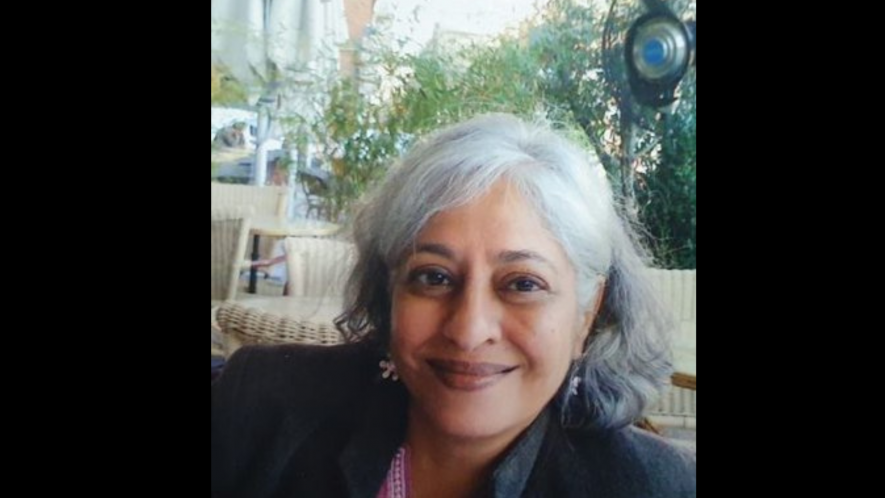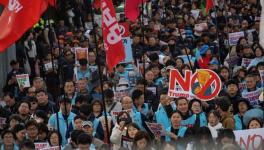People in J&K Feel Centre has Decided not to Restore Democracy: Radha Kumar

Radha Kumar. Image Courtesy: Twitter/@RadhaKumar
In their fourth annual report released on Thursday, the Forum for Human Rights in Jammu and Kashmir has once again reminded the public and the government of the plight of the people of the erstwhile state, who, despite the Centre’s claims, remain trapped in a growing spiral of violence.
Radha Kumar, a member of the Forum, is a specialist in ethnic conflicts and peace-making. A reputed author, she is the former director general of the Delhi Policy Group, an independent think tank. In an exclusive interview with Rashme Sehgal, she focuses on the challenges of the people of the strife-torn region. Edited excerpts:
Rashme Sehgal: Militancy has spread across the Valley and the Jammu region. The Narendra Modi government had made promises to the contrary following revocation of Article 370. This has not happened. Why?
Radha Kumar. As our report shows, the overall security situation began to deteriorate in 2016, when the BJP-PDP (Bharatiya Janata Party-People’s Democratic Party) coalition rift significantly increased. In 2019-2020, after revocation of Article 370 and the division of the state, the security situation deteriorated sharply in Jammu and the Valley while there was a sharp conflict on the Ladakh border with the PLA (People’s Liberation Army) following Chinese incursions.
In 2021-2023, security in the Valley improved slightly compared with 2019-2020, but the tense stand-off with the PLA continued in eastern Ladakh. In Jammu and Kashmir (J&K), too, the situation improved only on some parameters and deteriorated on others. For example, the attacks on the CRPF (Central Reserve Police Force) and/or police have increased (88 in 2019-2023 against 65 in 2012-2015). The [Kashmiri] Pandits and migrant workers continue to be targeted—in fact, the threat to them has escalated with 56 Pandit government employees reported to have been put on a “hit list” by militant groups.
The security situation also needs to be viewed from the human angle. Journalists and human rights defenders are arrested on flimsy grounds under the draconian UAPA [Unlawful Activities Prevention Act] and PSA [Public Safety Act], under which getting bail is extremely difficult. Kashmiri journalist Fahad Shah, for example, has been in prison for more than 500 days and Aasif Sultan for five years.
The high levels of proliferation of small arms at over half-a-million and drug use—roughly one in 130—also testify to the high sense of insecurity in J&K. Notably, crimes against women and children spiked by around 25% between 2019 and 2021, according to the National Crime Records Bureau (NCRB).
RS: How would you explain the death of a high proportion of CRPF troops between 2019-22 compared with the lower numbers in preceding years? Can these be linked to the large presence of weapons (over 5 lakh licensed weapons in J&K at the last count) or to militants?
RK: The high number of CRPF and/or police deaths are mostly alleged to be at the hands of militants. There are also cases of CRPF troops opening fire on colleagues. One problem is the length of service. I believe troops are rotated every 18 months; whereas, it should be every six months.
There is not enough data available publicly to link the increasing number of fatalities to any one cause.
RS: The revocation of Article 370 was welcomed by the people of Jammu as was delimitation of Assembly seats, which increased the region’s number to 43. However, Jammu residents are now critical of the process. Outsiders are buying land there and taking away businesses of the original inhabitants. Why has it happened?
RK: The changes to domicile and land rules have affected Jammu severely, triggering protests. The new Bills the Centre plans to pass in the current session of Parliament also affect Jammu more than the Valley. Paharis are being pitted against Gujjars and Bakerwals by the Constitution (Jammu and Kashmir) Scheduled Tribes Order (Amendment) Bill and the OBC [Other Backward Classes] categorisation has expanded the number of groups entitled to reservation in education and employment. The former, for example, threatens to add fuel to the already volatile conditions in the Pir Panjal region, which has a huge number of Gujjars and Paharis.
RS: Increasing militancy in the Poonch and Rajouri districts does not bode well for J&K. How high a concern is this?
RK: The increase in armed conflict in Poonch and Rajouri districts is a cause for grave concern given that the region was relatively calm. Cross-border support for armed attacks and infiltration by Pakistan-based militants appear to have increased whereas there was little local support for them earlier.
Several government actions have contributed to instability. Rising communal tensions between Hindus and Muslims across Jammu divisions fomented by political parties, the Delimitation Commission’s redrawing of constituencies on communal lines, merging Poonch and Rajouri with Anantnag, shootings by village defence guards and the new Bills are the contributory factors.
RS: Hasn’t increasing weaponisation by reintroducing the village guard system in Jammu also created greater public insecurity?
RK: LK Advani, as Union home minister, had set up armed village defence committees in 2003. They increased internal conflict and were quietly allowed to lapse. Why the policy has been reintroduced is incomprehensible. It has clearly added to the proliferation of small arms in the region.
RS: Targeted killings of Kashmiri Pandits (KP) continue. Your report highlights how a second wave of KP migration occurred last year with many relocating to Jammu. But after 300 days of protest, they called off the strike and returned to the Valley. These people had government jobs and could not sustain themselves financially because they were not receiving salaries. Why is this situation allowed to continue?
RK: As our report points out, the escalation of attacks on Pandits is a cause for serious concern. The government’s refusal to allow them to temporarily relocate to Jammu is callous given that the BJP and its affiliates campaigned for Pandit teachers to relocate to Jammu during the UPA [United Progressive Alliance] rule, when their targeting was relatively limited. The Forum has repeatedly said that involving eminent local leaders in the return of Pandits would provide some security.
RS: Why does J&K have the highest number of undertrials at 91% in proportion to its population compared with the national average of 76%?
RK: The figure of 91% is absolutely shocking. We do not have a breakdown of the charges, but there is little doubt that indiscriminate arrests under draconian laws constitute a high proportion. The Lieutenant-Governor’s (L-G) administration should answer, given that there is no intervention by political leaders as the administration claims was the case before August 2019. Is he unable to restrict indiscriminate arrests and ensure that detainees are heard?
RS: J&K has not held elections for nine years. Why is the Centre dragging its feet on such a crucial issue and what has been the fallout of this delay?
RK: The Centre’s inordinate delay and the Election Commission of India’s continuing silence are deplorable. The fallout has increased the belief in J&K that the Union government is determined to avoid restoring democracy in the former state.
RS: The Centre is also delaying including Ladakh under the Sixth Schedule. Ladakhis believe this is being done at the behest of some business houses because of the availability of key mineral resources in the region. Is the Centre alienating the entire population of this Union Territory?
RK: That might well be the case though it is also true that as an area of high security concern, the Centre might wish to continue direct rule. Whatever the reasons, it has only united Ladakhis in protest. Sadly, the Union government is alienating another border region.
RS: The report highlights how the National Investigation Agency (NIA) conducted raids in May 2023 on different Kashmiri outfits. What was the outcome of these raids?
RK: This information has not been placed in the public domain.
RS: Crimes against women and children are on the rise. These include a sharp rise in cases of kidnapping and sexual harassment. What are the reasons for this increase?
RK: In general, we find that sexual crimes always increase in conflict situations as does crime overall. I would say this is an example of that pattern.
RS: The overall sense one gets from reading the report is that the Centre and the L-G failed to curtail violence in J&K. Growing up in this combat zone has seen young people take to drugs. Is this also part of a pattern?
RK: The Centre’s policies are adding to physical and psychological violence rather than mitigating these. Notably, juvenile crimes have increased, which is linked to high unemployment. The L-G appears to be doing little even to fill vacant posts, perhaps because the Union Home Ministry has imposed stringent conditions that have led to purges in local administrative services, as our previous reports noted.
(Rashme Sehgal is an independent journalist.)
Get the latest reports & analysis with people's perspective on Protests, movements & deep analytical videos, discussions of the current affairs in your Telegram app. Subscribe to NewsClick's Telegram channel & get Real-Time updates on stories, as they get published on our website.
























